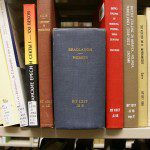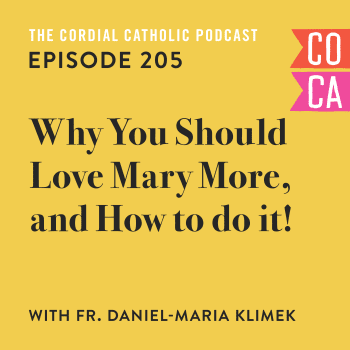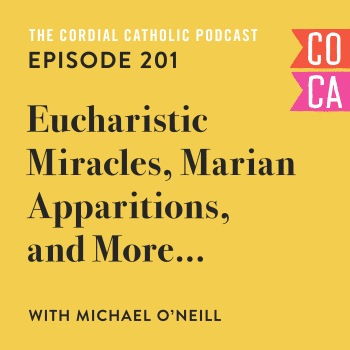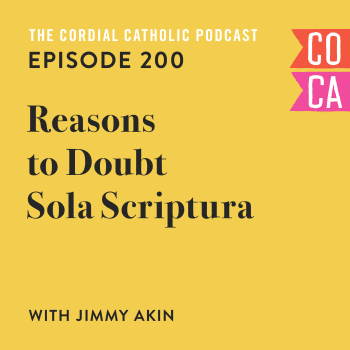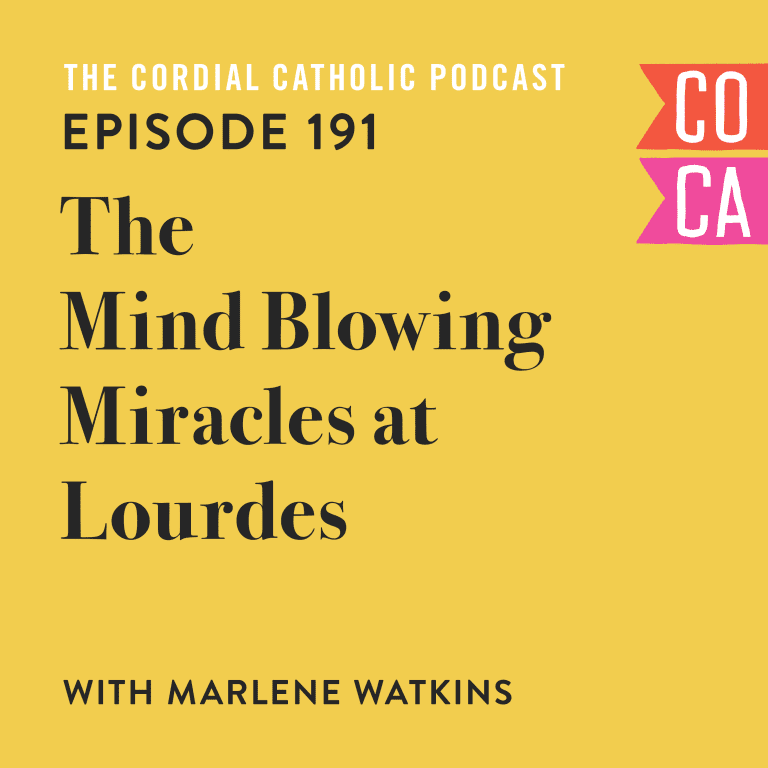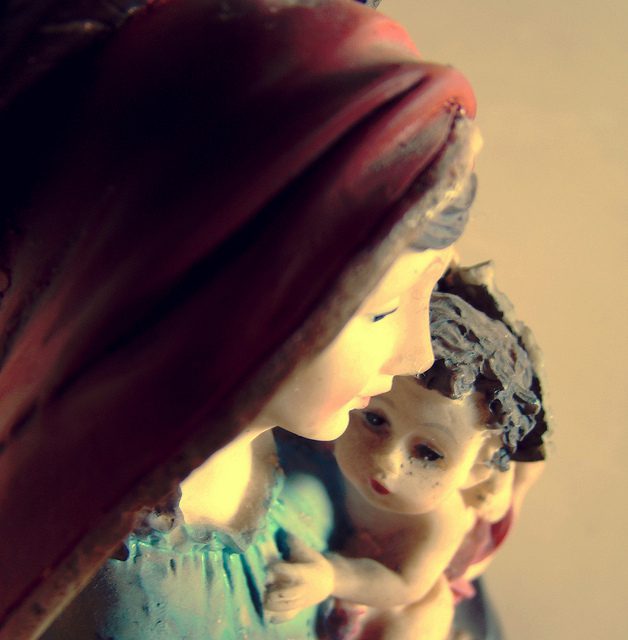
It goes nearly without saying that the prime objection of the Protestant to Catholicism is a fourteen year-old Jewish girl who said, “Yes,” and became the bearer of God. Rather, the prime objection of the Protestant to Catholicism is exactly what Catholicism has done with that 14-year old Jewish girl who gave birth to Jesus Christ—and that is to give her supreme esteem, an honour, and love. And that, on the face of it, sounds like a pretty decent thing to do.
As I began to become a Catholic there were certain refrains, largely from anonymous Protestants in dusty corners of Internet message boards, that become wholly cliche. You’ve heard them, too. Catholics worship Mary. Mary is an idol. Mary is the mother of God. While these cliches were voiced, sometimes loudly, on only certain dusty corners of the Internet they’re not held only by a select few. You’ve probably heard these beliefs—maybe you hold some of these beliefs—and likely, reader, you’ve never even darkened those dusty Internet message boards I was referring to.
But, nonetheless, we hold these beliefs. Or, rather, we believe things about what Catholics believe and, as Protestants, we often get it wrong. I often got it wrong and, in the end, had very little idea what the Catholic church actually taught about Mary. And, in the end, like so many aspects of Catholic theology once I realized what the Church actually taught—not just what I imagined it to teach—I found myself compelled further along the Roman road.
I want to touch, in this article, on Mary as Mother of God.
There is, in fact, a tremendous amount to unpack about Mary as a whole precisely because what the Church believes about her has been believed for a very long time, since nearly the very beginning, and that’s something remarkable in and of itself because one of the very popular and oft-repeated beliefs about Marian theology is that it’s something new, something invented by the Catholic Church only quite recently.
Well, it’s true, actually.
In a sense.
The Assumption of Mary, which I’ll write about at length later, was dogmatically defined by Pope Pius XII on November 1, 1950. This was also the last time the Pope spoke infallibly, using the authority that the Catholic Church sees itself being given by Christ.
Important for our understanding of Mary, however, is an understanding of how Catholic doctrine and dogma is defined. How and, rather, when it’s defined. On the topic of Mary’s Assumption, for example, overwhelming evidence of it being a strongly held belief by Christian Catholics can be found as early as the 4th century, growing stronger in the 5th century, and then being celebrated as an official Church feast in the 8th century.
Important to understand is that Catholic doctrine and dogma isn’t hastily defined and often it’s officially defined until it’s challenged. The Assumption of Mary wasn’t created out of thin air—although this is certainly what I used to think—but rather carefully and thoroughly developed, debated, and defined.
The Catholic Church believes that it has the deposit of faith and it is, indeed, very careful what it does with it.
I’ve met good, well-meaning and faithful Protestants who balk at referring to Mary as Mother of God and that, to me, has become kind of funny. It isn’t a term you hear very often in most evangelical Protestant circles, at least not in the ones that I’ve run in, and it sounds scary and Catholic so I can’t blame them.
But an understanding of Mary as Mother of God, the definition of her under that title, is nothing short of ancient.
See in the very Early Church, within the very first centuries, Christians grasped at a wide smattering of beliefs. You can see evidence of this in New Testament. The epistles of Paul, Peter, James, and the lot are almost always angled at building up the earliest Christian communities but also, sometimes in very strong terms, correcting their mistaken beliefs. Confusions over doctrine and theology didn’t cease with the death of the apostles and the full sum total of what Christians believed wasn’t fully and magically settled then either. It was, instead, in these early centuries that Christians had to hammer out exactly what they believed, based on the tradition that had been handed down to them from the apostles, on any number of things.
The nature of Jesus’s divinity was one of these chief things to be figured out.
I said, earlier, that I found it kind of funny when Protestants object to Mary as Mother of God (and I lump myself in here, too). It’s funny because in 431AD at one of the earliest Church councils, the Council of Ephesus, two doctrines are authoritatively defined. First, in response to misunderstandings within the body of Christian believers the nature of the divinity of Jesus is defined. Jesus is fully God and fully man; the dual natures of Christ.
The other doctrine is Mary as Mother of God.
I don’t know exactly how these things happen. I suppose it’s centuries of suspicious and mistrust and bad feelings but, like I said, I find it funny that the Council of Ephesus defined two doctrine. One, the divinity of Jesus, that nearly every Protestant on the face of the earth would, whole-heartedly, believe in. The other, Mary as Mother of God, which many Protestants who, roundly, object to.
Do you see the problem that I saw? How can the council be right on one hand and wrong on the other?
Mary is, precisely, the Mother of God because she bore Jesus’s whole self into the world: the human and the divine. The divinity of Jesus wasn’t imparted to him only after he was born, he was conceived by the Holy Spirit. So, ergo, Mary is the Mother of all of Jesus, divine and human.
St. Athanasius, a pillar of the Early Church, wrote sixty-six years before the Council of Ephesus what was already widely held by the Early Christians,
The Word begotten of the Father from on high, inexpressibly, inexplicably, incomprehensibly, and eternally, is he that is born in time here below of the Virgin Mary, the Mother of God.
But calling a 14-year old Jewish girl the Mother of God has certain implications—implications that, as a Protestant, I had never explored.
We call Mary the Mother of God because she was. In Eastern Orthodox tradition, Mary is poetically referred to as Theotokos, the “God-bearer.” She has a special place in Catholicism, Eastern Orthodoxy, and all of Christianity for the first 1,500 years, and beyond, precisely because of her special role. It might come as a surprise that Martin Luther, the earliest of the Protestant reformers held Mary to be the Mother of God and wrote strongly in defense of this theology. John Calvin, another prominent reformer, is largely seen to have agreed.
I admit that it’s true, when we acknowledge Mary as Mother of God it does something to us and our way of thinking about her. I acknowledge that it is, indeed, a little bit alarming. It means a change in perspective. It means an examination of self. It means a chance to re-think what you thought.
It means to see Mary as a young girl who said, “Yes,” to God’s saving grace. It means acknowledging that by this young girl’s affirmation, by her willingness to cooperate with God’s plan for salvation, we are all saved. No, Mary didn’t do the saving, but Catholics venerate—which means honour—Mary because she allowed God’s will to be done in and through her, literally. In the same was, a Protestants, we’re grateful when we can read the words of our Lord recorded, infallibly, by Matthew, Mark, Luke, and John we should be grateful for the woman—the girl—who bore our Lord. She should have a special place because of her special role, shouldn’t she?
As I continue my journey into the Catholic Church I’ve taken certain things to be true. I’ve taken these things after extensive study and reflection historical and theological perspectives—and from practically living these things out. One of these things, the Communion of the Saints, I find incredibly beautiful, powerful, and grace-filled. And I pray for Mary’s intercession, on a daily, sometimes hourly basis. I do not pray to Mary in the way I pray to Jesus, but I ask Mary, because she was chosen by God to bear His Son, because she is important and special as a result—because she must be—to pray for me.
For me, and for untold billions of people through all time and history, understanding, discovering, or rediscovering the doctrine of Mary as Mother of God means an deeper, richer, and more beautiful understanding of the role of Mary, who always points to her Son, Jesus Christ.



